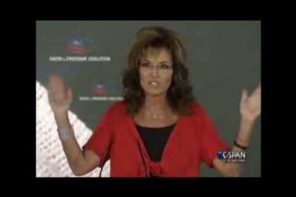Sarah Palin’s I’m not running but I am pre–presidential campaign tour rolled through Pennsylvania yesterday for a paid appearance to raise funds for the Plumstead Christian School.
Her trip to was accented by the “cookie controversy,” the state of Pennsylvania’s proposed initiative to help students to eat healthier by curtailing the sweets bought into classrooms for parties and events.
In a show of defiance, Palin showed up to the private Christian school with 200 sugar cookies for the students. The cookies would have been more meaningful if she had bought them to a public or inner-city school, where the gesture would count for something against “big government,” rather than the private Christian school, which was holding a fundraiser of $750 dollars a plate, plus 200 extra dollars to be photographed with Palin. At least the cookies were free, if nothing else was.
The real message of Palin’s talk was her linkage of faith with public service, and that American exceptionalism, founded upon the Declaration of Independence and the Constitution, was based on Judeo-Christian values, which which are superior to civil laws.
Palin is carefully crafting a stump speech that will gather together conservative Christians who like her, but are not quite ready to accept her as a viable presidential candidate. Questions have been raised in the media lately about Palin soft-pedaling her Christianity, but in her speech at Plumstead, she linked faith, America, and love of country deftly together for her Christian audience.
Setting the groundwork for her historical view on the formation of the nation, and reading from a prepared text, she touched on themes of the founding of the nation familiar to homeschoolers and Christian school students alike. Contrasting the formation of American with other countries, she said, “Most countries were born out of the ‘accident’ of history, wars, peace treaties, and the like,” but that America was the only nation formed by design, not historical accident. The country was, in her words, founded on an idea, an ideal. Quoting the Declaration of Independence, she declared that freedom doesn’t depend on the documents, but on “culture.” It’s a way of life, Palin said. The cookie is “freedom.” Palin’s charge to Plumstead parents was not to be afraid of the gospel, to recognize God’s providential hand, and that American is great, and a force for good in the world. She even threw in the shining city on the hill from Reagan for good measure. All of this, of course, garnered her a standing ovation.
Palin’s speech was peppered with scriptural references, the lament that “God” was not a part of the nation’s conversation and that “faith-based decisions and people serving for the right reasons” is an important part of public service. When the school’s chancellor gave her the opportunity to announce her candidacy, the crowd cheered. Of course, she gave the good stock answer about needing to pray and consult her family, but that if she ran, she’d be “in it to win it.”
The real takeaway from this speech is that it framed Palin’s worldview of American exceptionalism, Christian exceptionalism, and God’s intervention in political affairs. All of this is foundational to her thinking about public office, and the role Christians play in “restoring and reshaping” America. Palin’s followers are going to swallow this cookie whole. No one, however, should ignore the crumbs of the ideology she sprinkled about so freely. That ideology for many may be a very hard cookie to swallow on the road toward Iowa.


